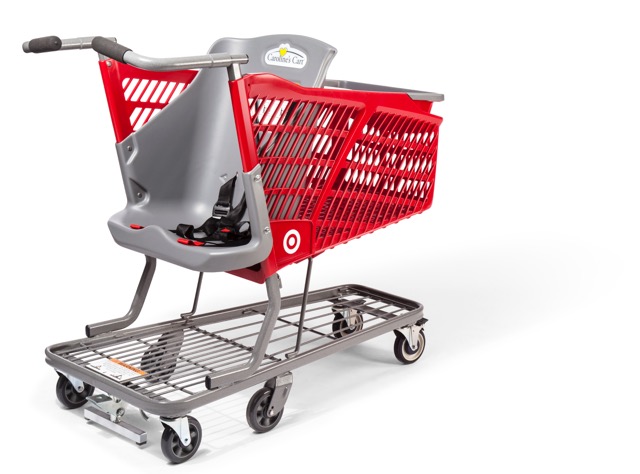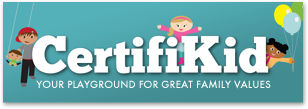By Joan Leotta
 Before Caroline’s Carts, a trip to the grocery store or a quick dash to pick up household or clothing items could be a logistical nightmare for families with a special needs child or an adult family member who cannot be left alone. By making it possible for these families to enjoy one more bit of normalcy in their lives, Drew Ann Long, inventor of Caroline’s Cart and the mother of a child with Rett Syndrome, has now changed the dynamic of that everyday experience.
Before Caroline’s Carts, a trip to the grocery store or a quick dash to pick up household or clothing items could be a logistical nightmare for families with a special needs child or an adult family member who cannot be left alone. By making it possible for these families to enjoy one more bit of normalcy in their lives, Drew Ann Long, inventor of Caroline’s Cart and the mother of a child with Rett Syndrome, has now changed the dynamic of that everyday experience.
Since its introduction to grocery stores in 2012, Caroline’s Cart has become a nationwide phenomenon. Target Corporation is the first national retailer store to offer this convenience to its customers, thus extending the “normal” shopping experience beyond groceries to electronics, home goods, housewares, hardware, clothing, and other categories. Each and every Target store makes at least one Caroline’s Cart available to much positive reception. Target spokesperson Kristy Welker comments, “We’re thrilled that Caroline’s Cart has made shopping easier for guests and we appreciate that our guests share photos of their shopping experience on their social channels. We’ll continue to put our guests at the center of everything we do to improve the shopping experience.”
How and Why Did Target Adopt These Carts?
Welker explains, “a former Target team member with a special needs child informed Target’s Store Operations team about Caroline’s Cart”. So, it was actually word of mouth that first stimulated Target’s interest in Drew Ann Long’s invention. Welker continues, “Additionally, some guests had notified our Guest Relations team about the carts. These suggestions prompted us to explore adding Caroline’s Carts to Target stores to positively impact guests’ shopping experience.”
The initial test drive, which took place in February 2015, was an immediate success. Welker shared that “after receiving positive guest reaction, we decided to add the carts to nearly all Target stores by March 19, 2016.” Each of the 1,780 Target stores has at least one Caroline’s Cart available. More can be added as individual stores anticipate customer needs.”
Development of the Cart
Drew Ann Long, developer and inventor of Caroline’s Carts, is the stay-at-home mother of Caroline, her special needs daughter, A resident of Alabaster, Alabama, Long first realized the need for these carts eight years ago when Caroline turned seven and as Long says, “was becoming too large for supermarket carts.”. What Long foresaw was not pleasant for her or her daughter: She says, “Imagine not being able to take your child to the grocery store.” Rather than surrender that basic yet meaningful activity, Long decided to make the world better for her family and for families like hers. Now imagine something that will allow you to continue to take your child with you. Such experiences, shopping at the grocery, in stores like Target, give families a sense of normalcy, they allow a family that has a child with a mobility disability or someone who has a family member with Alzheimer’s or even Autism to have the same typical shopping experience as that of their neighbors.”
Long notes that the first cart shipment, delivered to a local mom and pop grocery store, came on October 9, 2012 – Caroline’s birthday. The initial enthusiastic feedback from the store owners proved that Caroline’s Carts were an effective, pragmatic answer to a widespread challenge. Buoyed by this success, Long approached Technibilt, one of the nation’s largest grocery cart manufacturers.
Technibilt spokesperson Alice Little recalls that, “once Drew Ann Long met with us, she knew she wanted to partner with us and there was no stopping her. She had the vision and her presence in this project has been huge from the beginning until the present! Drew Ann helped to convince us that the need was there and that once the product was available that families with special needs older children and adults would jump in with both feet. Once the carts were tested and the first carts showed up in the stores, these families sitting quietly with their need came out of the woodwork.”
To generate interest in Caroline’s Cart throughout communities and around the country, Long met with local disability organizations while Technibilt spread the word among its client list. In fact, as Little notes, “Several groups have contacted us to endorse the cart. The largest group was Easter Seals. We were the very first product to bear the Easter Seal Logo. Caroline’s Carts also received the da Vinci Awards®, a prestigious, international forum celebrating the most innovative developments and research in all fields of assistive and adaptive technology.
Seeking to expand the carts’ availability, Technibilt has reached out to every major retailer in the U.S. and Canada as well as many smaller chains and local business operations. Little explains that while the manufacturer has “received a wonderful response to the product, Technibilt sales is not the hero in this story. The real heroes are all of the families who, once they heard about the product and saw it in use, contacted their own local stores and asked. ‘Can we get a Caroline’s Cart in our store?’ The key is that it is their store, where they shop… they will be faithful shoppers in their stores! They got the word out in their hometowns as well as on their social media accounts.”
The Cart’s Success
According to Technibilt, the company receives “100’s” of emails per day from cart users… they are wonderful emails… they tell their story to us and how the cart has changed their lives. We love these emails and answer every single one of them!”
Target’s Welker says that company has experienced the same enthusiastic gratitude. “The feedback that we’ve been hearing is overwhelmingly positive. Guests appreciate the ease that the carts offer.”
Getting Carts into More Stores
The ultimate goal of any business is economic viability. Technibilt’s Little says, “We knew Caroline’s Cart would sell. We knew if we built it and enlisted Drew Ann Long to help us market the cart, it would be a success, that Caroline’s Cart was going to be an award winning product.” She points out that the carts are also helpful for people with family members who other conditions that do not allow them to simply walk alongside another shopper and who also cannot operate the motorized carts.
Caroline’s Carts can be found in every state except Hawaii at Kroger, Publix, Hannaford, Food Lion, Whole Foods, Wegman’s and more. Having already expanded to Canada, Technibilt anticipates also debuting the product in Germany, Russia, Egypt, Spain, the United Kingdom and Australia. www.carolinescart.com offers a list of store locations where the carts are currently available. With the excitement of this product expansion, it is important to note that not all companies who provide the carts have them in all of their stores.
Some grocery stores still do not carry the carts at all. Long encourages families to speak up: “If you do not see a cart in a store, ask about it. If the store has a fun cart (shaped like a truck or car for children to use), or an electric scooter, you can point out to the manager that Caroline’s Carts are for those who cannot drive the scooters. If they have made one kind of provision, then they should be willing to provide an equal opportunity shopping experience to the underserved market of families with persons with a disability who are still out there.”
The Cart’s Facebook page is a great place to follow the progress of this dynamic invention as it continues to impact the world of inclusion. This page is also be a resource for families seeking to build advocacy networks, encouraging an even wider range of stores to make the Cart available.
Target’s collaboration with Technibilt marks significant progress in the work toward full inclusion. As part of its overall commitment to providing a positive shopping experience for all of its guests, Target has created a high visibility opportunity for families to participate more fully in the everyday tasks that make their lives work. As Target reminds us, however, the real heroes in this story are the everyday consumers, like Drew Ann and Caroline. Not only the Carts, but also the people who are out and about using them, hint at an exciting new normal for all of us.
 Bargains! They’re the clarion call of every shopper. The Internet has become an ideal platform for finding discounts on a multitude of goods and services. Although there were already many services offering deals and online coupons in the Washington DC metro area, Jamie Ratner, a Bethesda, Maryland mom and author of a popular blog on bargains for families, saw an unserved niche: She noticed that most deals offered on websites such as Groupon and Living Social were primarily aimed at young singles.
Bargains! They’re the clarion call of every shopper. The Internet has become an ideal platform for finding discounts on a multitude of goods and services. Although there were already many services offering deals and online coupons in the Washington DC metro area, Jamie Ratner, a Bethesda, Maryland mom and author of a popular blog on bargains for families, saw an unserved niche: She noticed that most deals offered on websites such as Groupon and Living Social were primarily aimed at young singles.